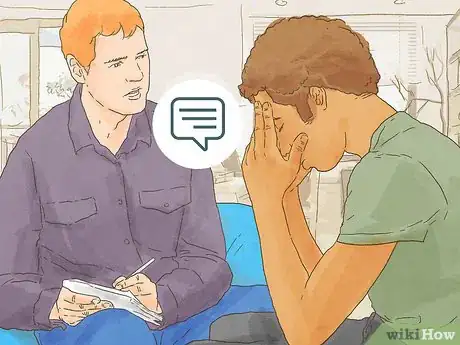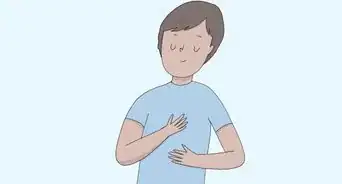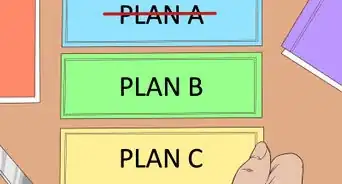This article was co-authored by Trudi Griffin, LPC, MS. Trudi Griffin is a Licensed Professional Counselor in Wisconsin specializing in Addictions and Mental Health. She provides therapy to people who struggle with addictions, mental health, and trauma in community health settings and private practice. She received her MS in Clinical Mental Health Counseling from Marquette University in 2011.
There are 15 references cited in this article, which can be found at the bottom of the page.
wikiHow marks an article as reader-approved once it receives enough positive feedback. In this case, 92% of readers who voted found the article helpful, earning it our reader-approved status.
This article has been viewed 147,525 times.
Overreacting means having an emotional reaction out of proportion to the situation.There are two kinds of overreacting: internal and external. External overreactions are actions and behaviors that other people can see, such as shouting at someone angrily. Internal overreactions are emotional responses that others may or may not notice, such as deciding to give up on the drama club because you did not get the part you wanted.[1] Both forms of overreaction result in damage done to reputations, relationships, reputation and self-esteem. You can avoid overreacting by learning more about what's causing your emotional response, and finding new ways of dealing with it.
Steps
Learning About Cognitive Distortion
-
1Learn to be aware of cognitive distortions. Cognitive distortions are automatic thinking patterns that cause the person to distort reality. For people who have overreactions, it is typically because of negative or highly self-critical judgement that make a person feel negatively about his or herself.[2] Unless a person learns to recognize a cognitive distortion, he or she will continue to react in a way that does not reflect reality. Everything gets blown out of proportion, often leading to over-reaction.
- These are typically formed in childhood. Having an authority figure (such as a parent or teacher) with a high level of perfectionism, or is overly critical, or with unrealistic expectations can easily lead to this.
- "Don't believe everything you think!" Becoming more aware of patterns of cognitive distortion allows you to make other choices in how to react. Just because you think something, does not automatically mean you have to accept it as fact. Challenging unhelpful or unscrutinized thoughts can lead to freedom.
- Only seeing the potential for negative outcomes, and habitually disqualifying the positive, is a common cognitive distortion.
-
2Understand Common Types of Cognitive Distortions. Everyone has had experience or at least seen others over-react to situations. For some people, these reactions can become a habit or way of seeing the world. These include:[3]
- Over-generalization. For example, a child who had a bad experience with a large dog may forever be nervous around dogs.
- Jumping to conclusions. Example: A girl is nervous about an upcoming date. The boy texts that he has to reschedule. The girl decides he must not be interested in her or that would not happen, so cancels the date. In reality, the boy was interested.
- "Catastrophising". A woman is having a rough time at work, and worries that she will be fired and then will be homeless. Instead of focusing on her time management skills, she suffers from constant anxiety.
- "Black and White" Thinking--being inflexible. On a family vacation, the father is frustrated by the poor quality hotel room. Instead of focusing on the lovely beach, and the kids who scarcely spend any time at the room, he constantly grumbles and ruins the fun for everyone else.
- "Should, Must, and Ought-to" These words are often loaded with judgement. If you find yourself using these words about yourself in a negative, judgmental way, consider re-phrasing it. For example:
- Negative: "I'm out of shape; I should go to the gym." More positive: "I want to be healthier, and I will check out if there is a class I might like at the gym."
- Negative: "I must get my kid to pay attention to me when I talk." Positive: "How can I talk so that he will listen to me more?"
- Negative: "I ought to get better than a B on my exam!" Positive: "I know I can get better than a B. But if I don't, a B is still a respectable grade."
- Sometimes things must, should, or ought to be done...there are some things that are properly worded in such a way. But catching yourself using these words negatively and in a rigid way indicates a way of thinking that may be unnecessarily negative and rigid.
- Write down automatic thoughts in a journal or diary. Just listing what you think can help you recognize its existence, when it happens, what it is, and help you observe them.Ask yourself if there is any other way to consider the source of your cognitive distortion. Is this automatic thought part of a pattern? If so, where did it start? How is it serving you now? Becoming more conscious of your own subconscious thought patters will help keep you from overreacting.
Advertisement -
3Identify "all or nothing" ways of thinking. This kind of automatic thought pattern, also known as "black and white" thinking, is a primary cause of overreaction. Automatic thoughts are not based in rational thought, but in fearful, overly emotional reactions to stressful situations.[4]
- The "all or nothing" thinking is a common cognitive distortion. Sometimes things are all-or-nothing, but normally there are ways to get some or most of what you want, or find an alternative.[5]
- Learn to listen critically to your inner self-talk, and notice what it's telling you. If your inner self-talk is filled with cognitive distortions, that can help you recognize that the "voice" that is talking to you is not necessarily accurate.
- Consider practicing affirmations to follow the automatic thought. Affirmations allow you to reframe the negative, "all or nothing" thinking with a positive statement that reflects your new beliefs. For example, remind yourself, "A mistake isn't failure. It's a learning process. Everyone makes mistakes. Others will understand."
-
4Take a deep breath before responding. Pausing to take a breath allows you time to consider possible alternatives. It may disengage you from automatic thought patterns. Breathe in through the nose for a count of four; hold the breath for a count of three, then slowly breathe out through the mouth for a count of five. Repeat if necessary.[6]
- When your breathing is rapid, your body believes it is engaged in a "fight or flight" struggle, and raises your anxiety level. You will be more likely to respond with heightened emotions and fear.
- If your breath is slower, your body will believe you're calm, and you'll be more likely to be able to access rational thought.
-
5Identify patterns in your overreactions. Most people have "triggers," which may generate emotional overreactions. Common triggers include envy, rejection, criticism, and control. By learning more about your own triggers, you'll be more likely to control your emotional reactions to them.[7]
- Envy is when someone else gets something you want, or that you feel you deserve.
- Rejection occurs when someone is excluded or turned away. Exclusion from a group activates the same brain receptors as physical pain.
- Criticism allows someone to engage in the cognitive distortion of overgeneralizing. The person confuses a critical response with not being liked or appreciated as a person, not just the single act that's being criticized.
- Control issues cause overreaction when you're overly worried about not getting what you want or losing what you have. This is also an example of catastrophising.
-
6Get some perspective. Ask yourself, "How important is this? Will I remember it tomorrow? Or a year from now? How about 20 years from now?" If the answer is no, then whatever you're reacting to in the moment isn't a big deal. Allow yourself to take a step back from the situation, and acknowledge that it might not be that important.[8]
- Is there any part of the situation that you can do anything about? Are there ways that you can work together with another person to make the changes that will help you? If there are, then try these.
- Try to become willing to accept the parts of the situation that you can't change. This doesn't mean allowing another person to hurt you or that you shouldn't have boundaries. Sometimes it means accepting that you can't change the situation, and deciding to leave.
-
7Retrain your brain. When someone habitually has a difficult time regulating their temper, the brain has a weak connection between its highly responsive emotional center, and the part of the brain responsible for rational thought. Building a stronger connection between these two brain centers helps to avoid overreacting.
- Dialectical Behavioral Therapy (DBT) is one treatment that has been shown to be effective with people who have emotional regulation challenges. It works through increasing self-knowledge and offering cognitive restructuring.[9]
- Neurofeedback and biofeedback are both therapies shown to be effective in treating people with emotional regulation issues. The patient learns to monitor his psychological response, and therefore gain control over his overreactions. Although some studies support the use of neurofeedback, more research needs to be done to determine whether it is effective.[10]
-
8See a professional. Overreacting might be the result of long-standing issues that a therapist can help you sort out. Understanding the underlying causes of your overreactions can help you gain control over them.[11]
- If your overreactions are affecting your relationship or marriage, consider seeing the therapist together with your partner or spouse.
- A good therapist will have practical suggestions for the present challenges, but will also look for issues from your past which may be surfacing through your emotional responses.
- Be patient. If your emotional overreactions are the result of long-buried issues, the treatment is likely to take some time. Don't expect results overnight.
- In some cases, you may be a candidate for medication. Although "talk therapy" is extremely helpful for many, sometimes certain medications can help. For instance, a person with anxiety that causes a lot of overreactions, anti-anxiety medication can be helpful.
Taking Care of Yourself
-
1Get enough rest. Sleep deprivation is a common source of stress, and can result in short tempers and overly-emotional responses to everyday situations. Taking care of yourself involves getting plenty of rest. If you're not getting enough sleep, it will be harder to change patterns of overreaction.[12]
- Avoid caffeine if it interferes with your sleep. Caffeine is found in sodas, coffee, teas, and other beverages. If you're drinking a beverage, make sure it doesn't contain caffeine.
- Feeling tired increases your stress level, and may cause you to think irrationally.
- If you can't alter your sleep schedule, try to include rest and relaxation times as a part of your daily schedule. Short naps may help.
-
2Make sure to eat regularly. If you're hungry, you're more likely to overreact. Include healthy, regular meals throughout your day. Make sure to eat a healthy breakfast with lots of protein and avoid hidden sugars in breakfast foods.[13]
- Avoid junk foods, sugary foods or other foods that may result in rapid elevation of blood sugar. Sugary snacks contribute to stress.
-
3Exercise regularly. Exercise helps emotional regulation, and brings about a more positive mood. 30 minutes of moderate exercise at least 5 times per week has been shown to have benefits for mood regulation.[14]
- Aerobic exercises, such as swimming, walking, running or cycling, use the lungs and heart. Include aerobic exercises as part of your workout routine no matter what other exercises you choose to include. If you can't spare 30 minutes per day, start with a shorter time period. Even 10-15 minutes will bring improvement.[15]
- Strength training, such as weight lifting or resistance training, helps strengthen bones as well as muscles.
- Flexibility exercises, such as stretching and yoga, help prevent injury. Yoga helps address anxiety and stress, and is highly recommended for those trying to avoid overreacting.
-
4Be aware of your emotions. When someone isn't aware of their feelings until they're already overreacting, it can be difficult to change. The trick is to become aware of your emotions before they're too big. Learn to identify within yourself the precursors to being overly reactive.[16]
- Signs may be physical, such as a stiff neck or rapid heartbeat.
- Naming the feeling means that you're able to employ both sides of your brain in developing coping strategies.
- The more aware you become of your own internal reactions, the less likely you will be to become overwhelmed by them.
Warnings
- Not all strong emotional responses are overreactions. Don't discount your feelings simply because they're intense.⧼thumbs_response⧽
- If your overreactions are causing you legal problems, seek help immediately.⧼thumbs_response⧽
- Sometimes overreactions can be a symptom of mental illness. If this is the case, you'll need to seek help for your mental illness while addressing the issue of overreacting.⧼thumbs_response⧽
References
- ↑ https://psychcentral.com/blog/how-to-stop-overreacting#1
- ↑ http://psychcentral.com/lib/15-common-cognitive-distortions/
- ↑ https://www.ncbi.nlm.nih.gov/pmc/articles/PMC4991044/
- ↑ https://www.webmd.com/mental-health/black-and-white-thinking
- ↑ https://www.psychologytoday.com/us/blog/turning-straw-gold/201907/how-break-the-painful-habit-all-or-nothing-thinking
- ↑ https://www.health.harvard.edu/blog/stress-raising-your-blood-pressure-take-a-deep-breath-201602159168
- ↑ https://www.psychologytoday.com/us/blog/your-emotional-meter/201808/how-stop-overreacting-the-small-stuff
- ↑ https://www.psychologytoday.com/us/blog/your-emotional-meter/201808/how-stop-overreacting-the-small-stuff
- ↑ https://www.psychologytoday.com/us/therapy-types/dialectical-behavior-therapy
- ↑ https://www.ncbi.nlm.nih.gov/pmc/articles/PMC4892319/
- ↑ https://screening.mhanational.org/content/how-do-i-find-therapist/
- ↑ https://www.apa.org/news/press/releases/stress/2013/sleep
- ↑ http://www.helpguide.org/articles/stress/stress-management.htm
- ↑ http://www.ncbi.nlm.nih.gov/pmc/articles/PMC3289183/
- ↑ http://www.helpguide.org/articles/exercise-fitness/emotional-benefits-of-exercise.htm
- ↑ https://www.helpguide.org/articles/mental-health/emotional-intelligence-eq.htm
About This Article
If you often overreact to situations, there are ways to help you step back and get some perspective. Practice labelling your emotions as they arise, which will train you to identify them before they grow out of proportion. For example, if you get furious over a driver who cuts you off, just tell yourself, “Okay, that’s anger.” This will also help you identify your common triggers. Then, you can be more cautious when you’re in situations that might make you overreact. When you feel a strong emotion coming on, take some deep breaths to ground yourself. Identify the emotion and tell yourself that it will pass. Once you’ve calmed down, you can react to the situation with a level head. If overreacting is causing major problems in your life, consider seeing a therapist to work through your emotions. To learn what causes common overreactions and more tips from our co-author, read on.








































































